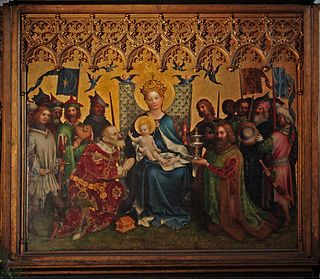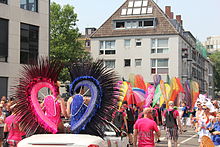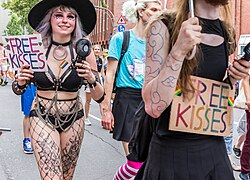
Christopher Street Day (CSD) is an annual European LGBTQ+ celebration and demonstration held in various cities across Europe for the rights of LGBTQ+ people, and against discrimination and exclusion. It is Germany's and Switzerland's counterpart to Gay Pride or Pride Parades. Austria calls their Pride Parade Rainbow Parade. The most prominent CSD events are Berlin Pride, CSD Hamburg, CSD Cologne, Germany and Zürich in Switzerland.

The Bläck Fööss are a music group from Cologne, Germany, started in 1970. From 1973 to 2003 Werner Dies was producer of the music group.

The Pascha is a 12-storey 9,000 square metre brothel in Cologne, Germany. With about 120 prostitutes, over 80 supporting-role employees and up to 1,000 customers per day, it is the largest brothel in the world.

M. DuMont Schauberg is one of Germany's oldest and largest publishing houses. It was founded by Bertram Hilden in 1620.

The memorial to gay and lesbian victims of National Socialism is a monument in Cologne, Germany, dedicated to the gay and lesbian victims of the Nazis.

Switzerland, a country which has long held a stance of neutrality in its relations with other nations, has not been immune to the movement of equality for lesbian, gay, bisexual and transgender citizens. Prior to the 20th century, sodomy and other types of sexual intercourse between people of the same sex was held in various levels of legal contempt. Today, the modern LGBT rights movement in Switzerland is related to the larger international movement which developed largely after 1969.

The Berlin Pride Celebration, also known as Christopher Street Day Berlin, or CSD Berlin, is a pride parade and festival held in the second half of July each year in Berlin, Germany to celebrate the lesbian, gay, bisexual, transgender and queer (LGBTQ+) people and their allies. Since 1979, the event has been held each year. Berlin Pride is one of the largest gay and lesbian organized events in Germany and one of the biggest in Europe. Its aim is to demonstrate for equal rights and equal treatment for LGBT people, as well as celebrate the pride in Gay and Lesbian Culture.

The Tauzieher is a limestone sculpture by Nikolaus Friedrich which was erected in 1911 in Rheinauhafen, Cologne. It depicts a man making a heavy rope or hawser fast to a bollard and is 6.5 metres in height. In 1980, it was listed as one of the first heritage sites in Cologne.

The term Cologne School of Painting was first applied in the 19th century to describe old German paintings generally. It subsequently came to refer more specifically to painters who had their workshops in medieval Cologne and the lower-Rhine region from about 1300 to 1550.

Wolfgang Albers is a German jurist. From 1 October 2011 to 8 January 2016 he has served as chief of the Cologne police.

The Hamburg Pride Celebration, usually known as CSD Hamburg, is a parade and festival held at the end of July each year in Hamburg to celebrate the lesbian, gay, bisexual, and transgender (LGBT) people and their allies, as part of international LGBTQ pride and Christopher Street Day festivities. Since 1980, the event has been held each year. Hamburg Pride is one of the many gay and lesbian organized event in Hamburg. Its aim is to demonstrate for equal rights and equal treatment for LGBT people, as well as celebrate the pride in Gay and Lesbian Culture.
The Kölnische Rundschau is a regional, independent daily newspaper for the Cologne/Bonn area. It is edited by Cologne Heinen-Verlag, which has its own independent local editorial office. The production of the national section was taken over by the Bonn General-Anzeiger during the first quarter of 2010. In the first quarter of 2018, the joint edition with the Kölner Stadt-Anzeiger sold 251,994 copies, a loss of 40% since 1999.

The Weltklasse in Köln was an annual one-day outdoor track and field meeting at the Müngersdorfer Stadion in Cologne, Germany. First held in 1934, it was organised by ASV Köln until 1999, when the meeting folded after its fiftieth edition due to financial reasons. Despite the meeting's long history, it was not included in the IAAF's international circuit, although it did receive IAAF Grand Prix status for its final edition.

James Saunders was an American dancer, choreographer and movement teacher.
Rivalry between Cologne and Düsseldorf, two major cities in the Rhineland, Germany, 40 kilometres (25 mi) apart on the Rhine, is now mostly on a sporting and cultural level, but based on historical and economic factors. Cologne was a Roman colony, and later a Free Imperial City, while Düsseldorf, a small medieval settlement, is now the capital of the state of North Rhine-Westphalia.
Michael Hampe was a German theatre and opera director, general manager (Intendant) and actor. He developed from acting and directing plays at German and Swiss theatres including the Bern Theatre, to focus on directing opera and managing opera houses, first at the Mannheim National Theatre, then the Cologne Opera from 1975. He was professor at the Hochschule für Musik und Tanz Köln since 1977. Hampe was influential for both the Salzburg Festival and, after the reunification of Germany, the Dresden Music Festival for which he commissioned and directed world premieres. He directed at international opera houses and festivals, including productions recorded for television, film and DVD.

The city of Cologne was significant to the development of the German colonial empire as a whole. During the period of New Imperialism, Cologne was one of the most important trading cities of the German Empire, and was thus the Rheinland's centre for expeditions and scientific colonialism.

The Kölnische Stadtmuseum is the municipal history museum of Cologne, North Rhine-Westphalia, Germany. It is housed in the former Franz Sauer fashion house since March 2024, which has been completely remodelled for the museum. The site is centrally located between the Minorite Church, Museum Kolumba and Breite Straße.
Kurt Neven DuMont was a German newspaper publisher and Nazi Party member.






















